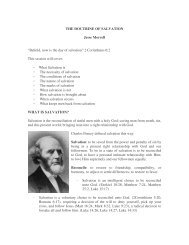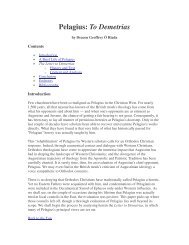Does_God_Take_Away_Free_Will_Jesse_Morrell 2.pdf - PinPoint ...
Does_God_Take_Away_Free_Will_Jesse_Morrell 2.pdf - PinPoint ...
Does_God_Take_Away_Free_Will_Jesse_Morrell 2.pdf - PinPoint ...
You also want an ePaper? Increase the reach of your titles
YUMPU automatically turns print PDFs into web optimized ePapers that Google loves.
“Then the man swung it the other way and the woman put<br />
her left hand upon the other side of the bell and it struck her left<br />
hand. For about five minutes it kept on striking against her hands<br />
until instead of fingers there were only shreds of flesh and blood<br />
left. Tears were flowing down the face of that woman in her<br />
suffering but she never made a sound, because she was suffering<br />
for a loved one. When the old man had finished she went down,<br />
the blood dripping to the floor, and she went to Cromwell, the man<br />
who had said her husband must die. She stretched forth her<br />
bleeding hands and said, “for the sake of these hands won’t you<br />
forgive my husband?”<br />
“Cromwell weakened and said, “Woman great is your love.<br />
Go in peace.” Thus her husband was freed through an act of grace<br />
on the part of their Governor and in recognition of the love and the<br />
suffering of another.” M. L. Dye (Exactly What Our Savior Taught<br />
About Sin)<br />
THE ATONEMENT WAS MADE<br />
FOR ALL SINS OF ALL MANKIND<br />
The atonement “must be of universal application, since<br />
there is no partially with <strong>God</strong>. <strong>God</strong> can have no selected favorites<br />
as long as He is love and universally benevolent...Thus whatever<br />
<strong>God</strong> makes possible, He will make equally possible for all men.”<br />
Gordon C. Olson (The Truth Shall Make You <strong>Free</strong>, Published by<br />
Bible Research Corp, p. 97)<br />
THE MORAL INFLUENCE OF THE ATONEMENT<br />
“The fact, that the execution of the law of <strong>God</strong> on rebel<br />
angels had not arrested, and could not arrest, the progress of<br />
rebellion in the universe, proves that something more needed to be<br />
done, in support of the authority of the law, than would be done in<br />
the execution of its penalty upon rebels. While the execution of<br />
law may have a strong tendency to prevent from the beginning of<br />
rebellion among loyal subjects, and to restrain rebels themselves,<br />
yet penal infliction do not, in fact, subdue the heart, under any<br />
government human or divine.” Charles G. Finney (1851<br />
Systematic Theology, p. 291)<br />
“Let it be distinctly understood that the divine law<br />
originates in <strong>God</strong>’s benevolence, and has no other than a<br />
benevolent end in view. It has revealed only and solely to promote<br />
the greatest possible good, by means of obedience. Now, such a<br />
law can allow of pardon, provided an expression can be given<br />
which will equally secure obedience–making an equal revelation of<br />
the lawgiver’s firmness, integrity, and love. The law being perfect,<br />
and being most essential to the good of his creatures, <strong>God</strong> must not<br />
set aside its penalty without some equivalent influence to induce<br />
obedience. The penalty was designed as a testimony to <strong>God</strong>’s<br />
regard for the precept and his law, and to his purpose to sustain it.<br />
An atonement, therefore, which should answer as a substitute for<br />
the infliction of this penalty, must be of such sort as to show <strong>God</strong>’s<br />
regard for both the precept and penalty of his law. It must be<br />
adapted to enforce obedience. Its moral power must be in this<br />
respect equal to that of the infliction of the penalty on the sinner.”<br />
Charles G. Finney (The Oberlin Evangelist; July 30, 1856; On the<br />
Atonement, p. 3)<br />
“The Lord Jesus by His life and suffering for the sins of the<br />
whole world...rendered satisfaction to public justice (a<br />
demonstration before all that rebellion against authority will be<br />
punished), as distinguished from retributive or vindictive justice,<br />
thus removing the governmental barrier to the free pardon of<br />
repentant sinners – the governmental of sin-prevention problem.<br />
The advent and sufferings of Christ has provided a moral force of<br />
far greater proportions to confront the minds of moral beings as<br />
they contemplate sin, than the threatened eternal punishment of<br />
sinners had provided. The great mass of unrepentant sinners have a<br />
public testimony of the awfulness of the Moral Governor’s hatred<br />
of sin and the dreadful certainty that no sin will go unpunished. If<br />
such an ordeal of suffering was endured by the <strong>God</strong>head to make<br />
the forgiveness of sin possible, sinful rebellion must be viewed as a<br />
colossal tragedy in the moral government of <strong>God</strong>, to be feared by<br />
all.” Gordon C. Olson (The Truth Shall Make You <strong>Free</strong>, Published<br />
by Bible Research Corp, p. 106)<br />
“The only means in all the universe to subdue the rebellious<br />
heart and uphold the moral government of <strong>God</strong> is the love shown<br />
for us on Calvary. It was the greatest and most profound event of<br />
all history. The death of the Lord Jesus did not render <strong>God</strong>


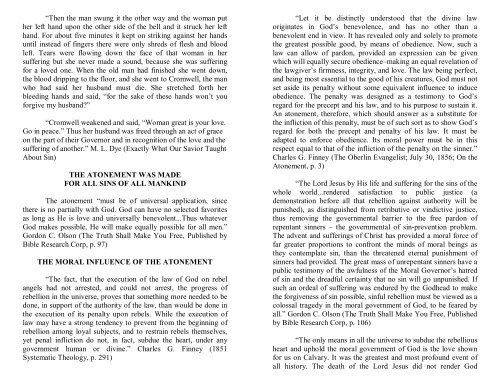

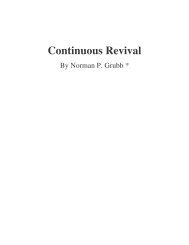
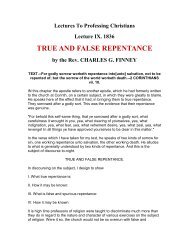
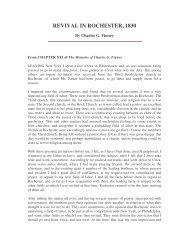

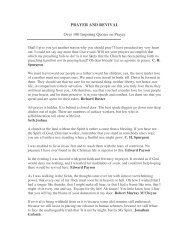
![[PDF] SIX DAYS OR MILLIONS OF YEARS? - Answers in Genesis](https://img.yumpu.com/34887318/1/190x245/pdf-six-days-or-millions-of-years-answers-in-genesis.jpg?quality=85)




